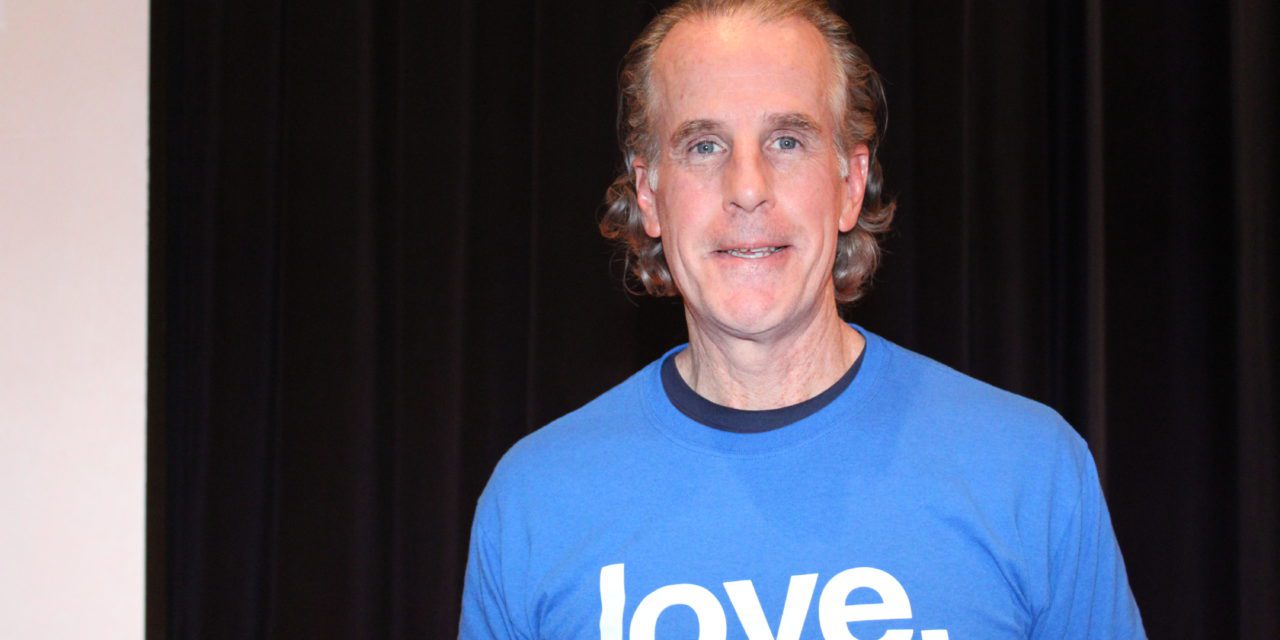DAVID FLOOD
By DAN TOMASELLO
LYNNFIELD — Kindness can change people’s lives, motivational speaker David Flood said during a presentation in the Lynnfield Middle School auditorium on Jan. 26.
Substance Use Prevention Coordinator Peg Sallade told the 25 parents and school officials in attendance that Flood was A Healthy Lynnfield’s first in-person guest speaker since the start of the COVID-19 pandemic.
“The goal of our Healthy Lynnfield speaker series is to help families recognize and respond to risk behaviors that kids might have,” said Sallade. “A theme we identified this year is around connections.”
Flood, who also gave presentations to Lynnfield High School students on Jan. 26, said he will “do anything or say anything” to relate to children. He wore a T-shirt with the word “love” on it to reinforce the message that kindness can make a positive impact.
“The goal of my talks is to connect with kids and help kids connect with one another,” said Flood. “It’s about inclusion.”
Flood said he and his wife, Mary, are very proud of their children Justin and Sarah. He said Justin is the reason he became a motivational speaker.
“I wouldn’t be standing in front of you today if it weren’t for my son,” said Flood. “Justin is 24, he loves anime and he loves wrestling. Justin also has autism. He is an amazing kid.”
Flood said he was inspired to talk about inclusion after Justin told him and his wife that he was lonely when he was a freshman in high school.
“That confused me because Justin went to a school with 2,000 kids,” said Flood. “I later watched a program about the opioid epidemic. I put the timer on the TV and as I was about to rollover to go to sleep, I heard three words that woke me up: Loneliness is toxic. I couldn’t go back to bed that night.”
Flood noted that, “Over 60 percent of people are living in social isolation.”
“The mortality rate of people living in social isolation is 15 percent higher,” said Flood. “It starts in fifth grade. That is the time when kids start building walls around themselves. Social isolation is a growing epidemic, and is one that is increasingly recognized as having dire physical, mental and emotional consequences. Loneliness is an especially tricky problem because accepting and declaring our loneliness carries a profound stigma. Admitting that we are lonely can feel that we failed. It attacks our basic instincts to save face, and makes it hard to ask for help. Loneliness can actually become contagious.”
Flood said it’s important for people, especially children, to include others in different activities.
“If you have a child who is more outgoing, please tell them to never stop reaching out,” said Flood. “It’s important to be an includer and bring people together.”
While Flood and his wife were focused on Justin’s struggles in school, he said they had no idea Sarah was struggling with anxiety because of her successes. He recalled how Justin became upset after his parents got into an argument. He overheard Justin telling Sarah that he was upset about the argument and was lonely because no one would eat lunch with him at school.
“Justin is pouring his heart out to her when I heard something that blew me away,” said Flood. “Sarah said to him, ‘Justin, I know how you feel because I have massive anxiety. I can’t even walk through the commons in between classes.’ I had no idea. Watch and be aware because you will never know which child you should be worried about.”
Flood gave the parents in attendance three different challenges to undertake. He said the first challenge is “know your child.”
“Ask questions and listen with your heart,” said Flood. “I was paying so much attention to Justin that I had no idea Sarah was struggling with anxiety. She told us a story that when she was 3- or 4-years-old that she actually hid under the coffee table in our living room for two hours because she wanted to see if we noticed that she was missing. Listen to your child.”
While Flood said helicopter parenting was popular in the 1980s and lawn mower parenting was popular in the late 1990s and early 2000s, he said a number of parents today are “jackhammer parents” who frequently interfere in their children’s lives.
“It’s important to advocate for your kids, but teach them to advocate for themselves,” said Flood.
Flood said the second challenge is “know who is on your team.” He encouraged parents to communicate frequently with their children’s teachers and listen to them. He recalled that first-grader Dylan Hockley was killed at Sandy Hook Elementary School in Newtown, Connecticut 10 years ago.
“Dylan was killed when he was 6-years-old,” said Flood. “When the police found Dylan, they found his aide, Anne Marie Murphy, wrapped around him while trying to protect him. She gave up her life for him. There are also people like Aaron Feis, who was a physical education teacher at Marjorie Stoneman Douglas High School in Parkland, Florida. He blocked a glass door so kids could get out of the building. He gave up his life so kids could get out. That is who works in schools.”
Flood said his third challenge for parents is to let their children fail.
“Don’t be a lawn mower parent,” said Flood. “Let them fail. They don’t have to go through a problem alone, but you don’t go through it for them. You go through it with them. I learned more about myself in the last 30 months than in the last 30 years being around Justin.”
Flood also encouraged parents to share their experiences with their children. He also said parents should give their children “lots of choices.” He recalled that a boy once told him he was upset that he couldn’t perform in the school play because his parents wanted him to be a competitive swimmer.
“If you limit choices, children’s anxiety levels go up,” said Flood.
In addition to the three challenges he gave parents, Flood also shared the three challenges he gave LHS students earlier that day.
“The three challenges for kids are ‘look on the inside,’ ‘thank two adults’ and ‘no one eats alone,’” said Flood. “The ‘no one eats alone’ piece is anytime. Please teach your kids to look for opportunities to include others. That is all I ever wanted for Justin, and I believe in my heart and my soul that is what everybody wants.”
Flood recalled how Justin decided to stay home on Halloween in sixth grade because he had no one to go trick-or-treating with, and his parents wouldn’t let him go alone. He said two of Justin’s classmates, Kevin and Cameron, waited at the end of his driveway and asked him if they could take him trick-or-treating.
“It was an act of kindness,” said Flood. “When you perform an act of kindness for someone, three people benefit: Them, you and anybody watching. Teach your children to show up for someone else. Kids are hurting right now and the more trusted adults and friends that they have, the better off they will be. Their mental health will improve drastically.”
Flood recalled that he and Justin are the co-authors of a children’s book called “A Kids Book about Autism.”
“It’s a book meant for a trusted adult to read to a kid,” said Flood. “It’s a conversation between Justin and I. We are super proud of it. If you got 25-feet from Justin, he would not sell you a book. He will give you a book. That book did so much for his self-esteem. He is so proud of it.”
Flood recalled that his mother gave some of the most important advice he has heard before she passed away.
“Your life is not about you,” said Flood. “It’s all about the people around you, especially the people you love.”
After Flood concluded his remarks, he was given a round of applause.





